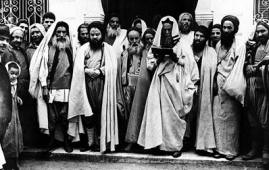 Chumash
ChumashTraduction in arabic by Saadia Gaon ben Joseph (Sa'îd ibn Yûsuf al-Fayyûmî)
Hilulah Day: Iyar-26
Rabbi Saadia Gaon
Born: Al Fayyum, Egypt, 882
Died: Sura Babylonia, 942
Universal leader of Jewry, religious philosopher
Baylonia was the primary focus of Jewish learning for many centuries. The heads of the Babylonian academies of Sura and Pumbedita were called Gaonim and were widely recognized as the preeminent scholars of their day. With this distinction came the authority to promulgate religious decisions for the community. Saadia was the greatest Gaon of all times. He lived during the time that the Muslims ruled Asia Minor.In Saadia's day, he sought to reconcile the philosophical perspective of Islam, to which Jews living in Islamic countries were exposed, with the Torah.
Much of Islamic philosophy at this time was grounded in the thinking of Aristotle and Plato, and so Saadia wrote about this, as well. His most famous book is entitled Ha'Emunot Ve'hade'ot ("Faith and Belief") and it was written originally in Arabic, later translated into Hebrew by the Ibn Tibbon family.In this book, Saadia attempts to reconcile Judaism with the philosophical thinking of Aristotle and Plato, his goal being to bring assimilated Jews back to Torah and halacha. Saadia demonstrates that the teachings of the Torah will stand the test of logical inquiry. He offers unassailable proofs that the universe was created exnihilo - out of nothing, that the Creator is One, that man has a soul, that the Torah was given to the Jewish people by God on Mount Sinai, and that man has the freedom to choose between good and evil and receives reward or retribution accordingly.In addition, Saadia wrote the first Arabic translation of the Bible, which includes commentaries and grammatical notes.
He also wrote the first Hebrew dictionary, and a book about Hebrew grammar. Muslims at this time were involved in Arabic language and grammar studies and Saadia hoped to inspire Jews to explore their own religious roots more deeply.The RAMBAM (Maimonides) said of Saadia, "If not for our master Saadia Gaon, Torah would have been forgotten in Israel." Among his many books, Rabbi Saadia also wrote a commentary on Sefer Yetzirah.In Saadia's day, one of the most significant threats to Jewish life came from the Karaites, a group whose origins lay in the Jewish community, but who had separated from the Jewish community in opposition to rabbinic Judaism. The Karaites maintained that the laws of the Talmud were not obligatory upon Jews because they were written not by God, but by the rabbis.
The Karaites claimed that only the Torah comes from God and it, alone, should serve as the basis of Jewish authority and life.Traditional Judaism has always maintained that the Talmud is the Torah she'b'al peh (the Oral Torah, given at Sinai but transmitted orally for much of our history until it was finally written down in the academies of Babylonia). Saadia defended rabbinic authority against the claims of the Karaites, going so far as to declare that they were not Jews.
On Free Will...Saadia maintained that human beings possess free will, the capacity to make choices about their behavior. Muslim philosophers at this time promoted the Kallam, a system of thought which denies the existence of free will as an allusion and even denies causality of events in the universe, ascribe all power and will to Allah. Saadia parted company with Muslim philosophers over the issue of free will, for several reasons. First, if God is the first and only cause in the universe, then there is no difference between the righteous and sinners; all do the will of God. Hence there is no difference between a righteous deed and a sin. Second, if God is fully in control of people's behavior, then it makes no sense to punish one who breaks the law, since s/he is merely doing the will of God.
Finally and most importantly from a Jewish perspective, in a universe totally dominated by the will of God, mitzvot have no purpose or meaning, since people are incapable of "obeying" or "disobeying" them. There can only be a commandment if there is someone capable of accepting the commandments. In an effort to emphasize the role of free will in Jewish thinking, Saadia placed great emphasis on the covenant made at Sinai, in which the Israelites freely obligated themselves to God.Hence Saadia maintained that God created us with free will, a concept that has always been central to Jewish thinking.
May the merit of the tzaddik Rabbi Saadia Gaon protect us all, Amen.





